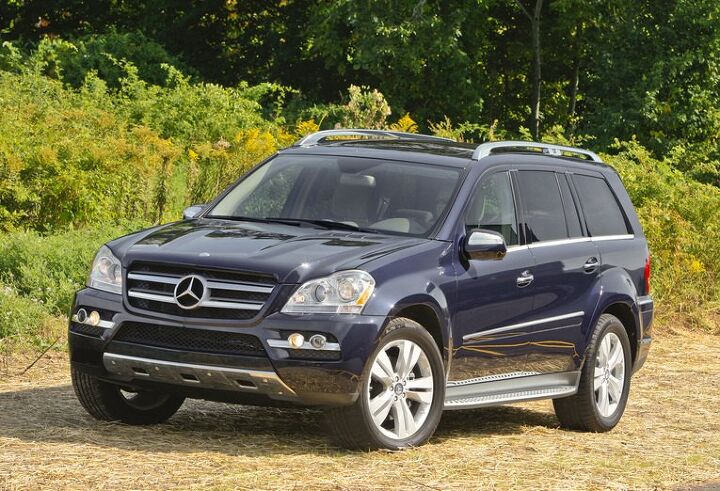Mercedes Recalling Almost One Million Cars Over Bad Brake Boosters

Over the weekend, Mercedes-Benz announced a global recall campaign encompassing nearly a million vehicles it believes could be afflicted with faulty brake boosters.
“We have found that in some of those vehicles, the function of the brake booster could be affected by advanced corrosion in the joint area of the housing,” the automaker explained in a statement.
While the issue is global, the United States is believed to account for roughly 300,000 units, with the National Highway Traffic Safety Administration (NHTSA) advising against driving any vehicle involved in the recall. Affected units will undoubtedly offer lowered braking performance and can even cause total brake failure in some instances. Rare or not, the NHTSA feels this one is simply too risky to chance.
Affected vehicles include GL, ML, and R-Class Mercedes-Benz products manufactured between 2006 and 2012 ( a comprehensive list is available here). U.S. regulators are basically going off the MBUSA recall report citing the possibility for moisture to accumulate and cause corrosion within the brake booster housing. The planned fix involves having dealers look at the entire unit and replace them “as necessary.”
Mercedes said there were no known injuries relating to the matter. However, the NHTSA is mighty concerned about a potential vacuum leak creating problems for people on the road. A leaky booster will probably result in a mushy or unresponsive brake pedal and longer stopping distances on the road. Due to the potential hazard (and risk of outright brake failure), the agency has advised all owners not to drive any model under recall until it’s been serviced.
Mercedes first noticed the issue in 2021, launching an internal investigation that fall. The automaker felt confident that the risk was sufficient to launch a recall by May of 2022 and made a formal announcement over the weekend.
Those concerned about their vehicle can toss their vehicle identification number (VIN) into the NHTSA database or use the recall campaign code 22V315000. Alternatively, customers can also contact Mercedes-Benz directly at 1-800-367-6372 or use the NHTSA safety hotline at 1-888-327-4236.
[Image: Mercedes-Benz]

A staunch consumer advocate tracking industry trends and regulation. Before joining TTAC, Matt spent a decade working for marketing and research firms based in NYC. Clients included several of the world’s largest automakers, global tire brands, and aftermarket part suppliers. Dissatisfied with the corporate world and resentful of having to wear suits everyday, he pivoted to writing about cars. Since then, that man has become an ardent supporter of the right-to-repair movement, been interviewed on the auto industry by national radio broadcasts, driven more rental cars than anyone ever should, participated in amateur rallying events, and received the requisite minimum training as sanctioned by the SCCA. Handy with a wrench, Matt grew up surrounded by Detroit auto workers and managed to get a pizza delivery job before he was legally eligible. He later found himself driving box trucks through Manhattan, guaranteeing future sympathy for actual truckers. He continues to conduct research pertaining to the automotive sector as an independent contractor and has since moved back to his native Michigan, closer to where the cars are born. A contrarian, Matt claims to prefer understeer — stating that front and all-wheel drive vehicles cater best to his driving style.
More by Matt Posky
Latest Car Reviews
Read moreLatest Product Reviews
Read moreRecent Comments
- Dartdude Having the queen of nothing as the head of Dodge is a recipe for disaster. She hasn't done anything with Chrysler for 4 years, May as well fold up Chrysler and Dodge.
- Pau65792686 I think there is a need for more sedans. Some people would rather drive a car over SUV’s or CUV’s. If Honda and Toyota can do it why not American brands. We need more affordable sedans.
- Tassos Obsolete relic is NOT a used car.It might have attracted some buyers in ITS DAY, 1985, 40 years ago, but NOT today, unless you are a damned fool.
- Stan Reither Jr. Part throttle efficiency was mentioned earlier in a postThis type of reciprocating engine opens the door to achieve(slightly) variable stroke which would provide variable mechanical compression ratio adjustments for high vacuum (light load) or boost(power) conditions IMO
- Joe65688619 Keep in mind some of these suppliers are not just supplying parts, but assembled components (easy example is transmissions). But there are far more, and the more they are electronically connected and integrated with rest of the platform the more complex to design, engineer, and manufacture. Most contract manufacturers don't make a lot of money in the design and engineering space because their customers to that. Commodity components can be sourced anywhere, but there are only a handful of contract manufacturers (usually diversified companies that build all kinds of stuff for other brands) can engineer and build the more complex components, especially with electronics. Every single new car I've purchased in the last few years has had some sort of electronic component issue: Infinti (battery drain caused by software bug and poorly grounded wires), Acura (radio hiss, pops, burps, dash and infotainment screens occasionally throw errors and the ignition must be killed to reboot them, voice nav, whether using the car's system or CarPlay can't seem to make up its mind as to which speakers to use and how loud, even using the same app on the same trip - I almost jumped in my seat once), GMC drivetrain EMF causing a whine in the speakers that even when "off" that phased with engine RPM), Nissan (didn't have issues until 120K miles, but occassionally blew fuses for interior components - likely not a manufacturing defect other than a short developed somewhere, but on a high-mileage car that was mechanically sound was too expensive to fix (a lot of trial and error and tracing connections = labor costs). What I suspect will happen is that only the largest commodity suppliers that can really leverage their supply chain will remain, and for the more complex components (think bumper assemblies or the electronics for them supporting all kinds of sensors) will likley consolidate to a handful of manufacturers who may eventually specialize in what they produce. This is part of the reason why seemingly minor crashes cost so much - an auto brand does nst have the parts on hand to replace an integrated sensor , nor the expertice as they never built them, but bought them). And their suppliers, in attempt to cut costs, build them in way that is cheap to manufacture (not necessarily poorly bulit) but difficult to replace without swapping entire assemblies or units).I've love to see an article on repair costs and how those are impacting insurance rates. You almost need gap insurance now because of how quickly cars depreciate yet remain expensive to fix (orders more to originally build, in some cases). No way I would buy a CyberTruck - don't want one, but if I did, this would stop me. And it's not just EVs.


































Comments
Join the conversation
Given the amount of vacuum leaks I see on 15 yr old brands of "everything", I really don't see this as Armageddon.
Kudos to Mercedes for the recall. These are old cars, long past the original leasee and cpo owner. Unlikely they'll gain new customers as a result of this. I recently got a recall for my 15 year old car for a PVC heater replacement, also due to safety risks. Carmakers aren't in the habit of doing things out of the goodness of their non-existent hearts or because it's the moral thing to do, but I will call out every time they do something good for customers who - as has already been stated - aren't really even Merc customers.